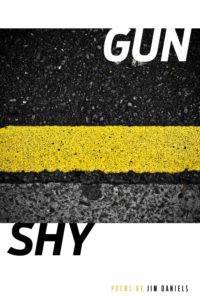“Poet laureate of my neighborhood / until I took out garbage on the wrong day.”
From the Publisher: “The poems in Gun/Shy deal with the emotional weight of making do. Tinged with both the regrets and wisdom of aging, Jim Daniels’s poems measure the wages of love in a changing world with its vanishing currency. He explores the effects of family work—putting children to bed, leading parents to their final resting places—and what is lost and gained in those exertions. Childhood and adolescence are examined, through both looking back on his own childhood and on that of his children. While his personal death count rises, Daniels reflects on his own mortality. He finds solace in small miracles—his mother stretching the budget to feed five children with “hamburger surprise” and potato skins, his children collecting stones and crabapples as if they were gold coins.
Daniels, as he always has, carries the anchor of Detroit with him, the weight both a comfort and a burden. He explores race, white privilege, and factory work. Eight Mile Road, a fraught border, pulses with division, and the echoes of music, singing through Detroit’s soiled but solid heart, resonate in these poems. His first long poem in many years, “Gun/Shy,” centers the book. Through the personas of several characters, Daniels dives into America’s gun culture and the violent gulf between the fearful and the feared.
Throughout, he seeks connection in likely and unlikely places: a river rising after spring rain and searchlights crossing the night sky. Comets and cloudy skies. Cement ponds and the Garden of Eden. Adolescence and death. Wounds physical and psychic. Disguises and more disguises. These are the myths we memorize to help us sleep at night, those that keep us awake and trembling. Daniels’s accessible language, subtlety, and deftness make this collection one that belongs on every poetry reader’s shelf.”
About the author: “A native of Detroit, Jim Daniels currently lives in Pittsburgh and is the Thomas S. Baker University Professor Emeritus at Carnegie Mellon. His recent books include Rowing Inland (Wayne State University Press, 2017) and The Perp Walk. He also coedited the anthology RESPECT: The Poetry of Detroit Music.”
“Jim Daniels is one of our best chroniclers of an American past that is, for better and worse, gone. As such, his is a poetry that laments and celebrates our present moment—its people, the lives they live, the ideas they live by, and the places, people, and things they call theirs. When one of his speakers says, ‘Today, / I’m just watching. Carried away,’ you realize a pact has been made (between the speaker and world) and a promise fulfilled (by the poet for the reader): that these poems will carry you away, that the voice behind them ‘wants to kneel on the floor / and whisper a prayer / like in the old days.’ Now more than ever, we need those prayers, and these poems.”– Hayan Charara, author of Something Sinister
“In this new collection by one of our country’s best poets, Daniels brings us the news from this world and transforms it into the news from beyond this world. These are poems of time and place, written in familiar voices, suggesting narratives that could be our own, but he’s infused each line, each poem, with mystery and music. These are poems that escape their form, and remake themselves in the reader’s mind—in our moment and in our memory. This is poetry that inspires and terrifies. These lines are poignant, unforgettable, resonant, but somehow remain conversational, as if this poet is simply tossing off brilliance with each new observation, each sharp image. This is the strongest collection yet from one of our most important poets.”– Laura Kasischke, author of The Time Machine
“Daniels’ Gun/Shy is a journey. It is not just a book of poems, but a long journey from his childhood home of Warren and Detroit to adulthood, where somewhere along this long journey, the city evolved even as the author or we all evolved. There is something profound about Jim Daniels’ ability to humble us through poetry that is self-effacing at a moment in history where we most need to step away from ourselves in order to know the larger world outside of us. These powerful poems will make you laugh, wonder, pause, but long after you have laid the book down, deep inside your heart, they will reveal something profound about the way we all become survivors. This is an urgently necessary book coming to us at such a time.”– Patricia Jabbeh Wesley, author of Praise Song for My Children: New and Selected Poems
“Jim Daniels’ poetry explores not only the realities of a blue-collar, late twentieth-century, upper Midwest childhood, but the entirety of America’s sociocultural whirlwind throughout these last six decades. Few writers believe more deeply in poetry’s capacity to document the world, and documentation, in his hands, is a form of homage. Sure, Gun/Shy is a new chapter in Daniels’ grand, literary-historical project—more importantly, it is an essential collection from one of our contemporary masters.”– Campbell McGrath, Philip and Patricia Frost Professor of Creative Writing, Distinguished University Professor of English, Florida International University
On nights when searchlights crossed the sky
I believed in magic and riches, God and fame,
or at least somewhere to go when I died
though the beams only meant a sale at some car lot
on Eight Mile, or Family Night at the ball game—
on nights when searchlights crossed the sky
with bold swords that made brave stars shy.
Some nights on our cracked street I followed their aim
until my mother called me in to tell me lies
like we’re not poor and boys don’t cry.
Our lights were dim with no cash and lots of blame.
My father worked nights while searchlights crossed the sky.
When my grandmother fell out of bed, he and I
drove to lift her from the floor and her own shame
for being a burden, hating my mother, wanting to die.
We passed Mel Farr’s Fords—clear haloes of lights aimed
high looked like nothing we could ever hope to claim
on our way home, below searchlights across the sky,
leaving us nowhere to go when we died.
HONORARY HONOR
Poet laureate of my neighborhood
until I took out garbage on the wrong day.
For poets, every day is garbage day, I said.
Tell that to the landfill, they said.
They appointed the blind woman across
the street to replace me. She’s loud
but polite. Poet laureate of my house
until I forgot to make my bed. I’m just going
to lie in it again anyway, I said. They said
you’re sleeping on the job, and appointed
the dog instead. His poems untranslatable,
but he offers protection.
Now, I’m poet laureate of my closet.
Everyone loves me there, alone in the dark.
HIGH SCHOOL DIPLOMA, 1917
Marie Cogan, my grandmother, lost
two children within two years. Balancing
on a wobbly footstool imported from Ireland,
she scrubbed her walls clean of them, then never
cleaned again. Marie Cogan lied about her age
until the past hazed over into truth. The one child left
conceded to the ghosts, left home and became
my father. Marie Cogan brushed my sister’s hair
with the violence of a true believer and took communion
for superstitious reasons. Marie Cogan played cards
with neighbor ladies and collected music boxes,
though eventually lost her false teeth and believed
I was a doctor come to save her. She took her diploma
to the home where it hung above her bed, alone
without photographs: Marie Cogan, in stately scrawl
enlarged by pride—few girls finished. Not one careless
scrap of her dead children in the stinging white
of her tiny shared room lit by music boxes
and the stench of dying. My grandfather, entering late
through the back door of their rotting wood-frame house,
takes off his work shoes and hat, washes up at the sink,
and heads to his own cold room in the back. He quit school
to work at Packard’s, lying about his age, then had to lie
again, pretending to take the day off to sign up for the draft—
the only lies he ever told, except the ones of omission,
as far as I know, I, who carried both their caskets
and laid them into the earth next to the graves
of those two children, brushing away dirt from flat stones
carved with the names never spoken except haltingly,
once, by my father. Marie Cogan, the priest intoned.
She lived her whole life in one house until she could
no longer. Marie Cogan. I will sing her name
in the Old English script. Holy Redeemer High School,
have mercy on us all.
These poems are excerpted from Gun/Shy. They are published here courtesy of the author and should not be reproduced without permission.


























